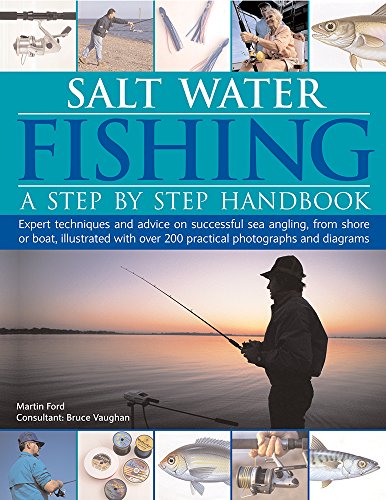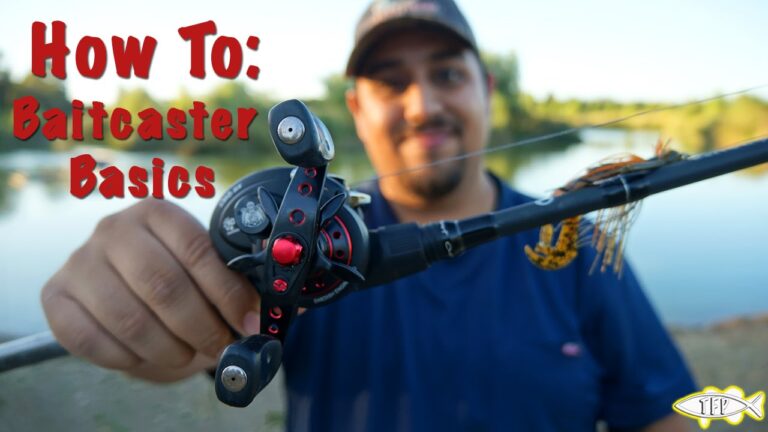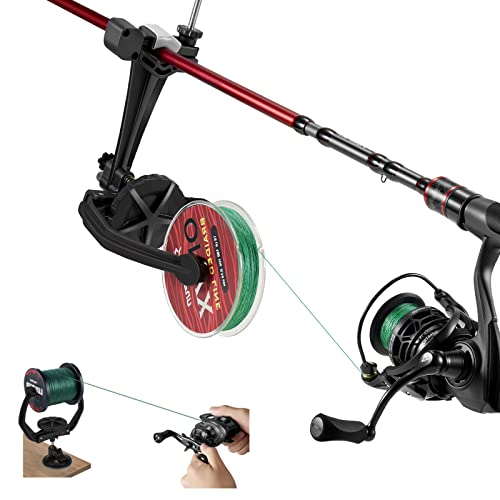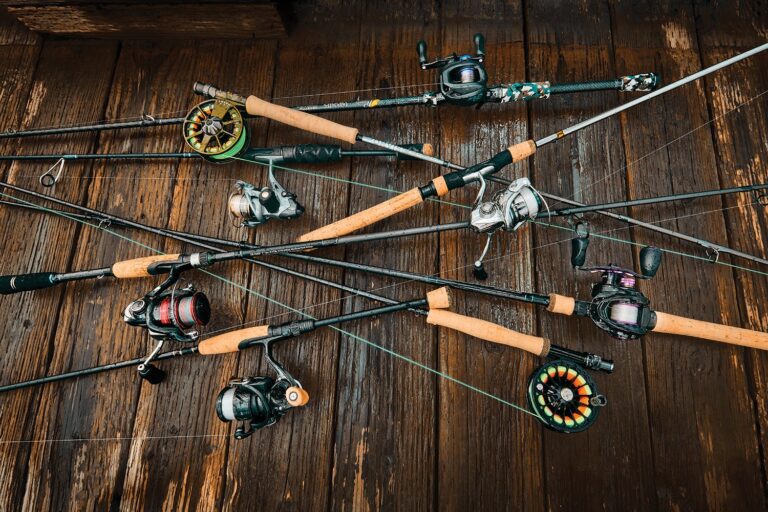Baitcasting reels are good for saltwater due to their durability and ability to handle heavier lines and lures. These reels offer precise casting control and are popular among experienced anglers in saltwater fishing due to their exceptional accuracy and power.
With their strong construction and advanced technology, baitcasting reels can withstand the harsh conditions of saltwater environments and provide reliable performance. Whether you are targeting larger saltwater species or fishing in challenging conditions, a baitcasting reel can be a great choice for your saltwater fishing adventures.

Credit: www.abebooks.com
Understanding The Benefits Of Baitcasting Reels For Saltwater Fishing
Baitcasting Reels: A Game-Changer For Saltwater Anglers
When it comes to saltwater fishing, having the right equipment can make all the difference. One tool that has revolutionized the sport for many anglers is the baitcasting reel. With its unique design and capabilities, baitcasting reels offer a number of benefits specifically tailored for saltwater fishing.
Whether you’re targeting massive game fish or casting in challenging conditions, understanding the advantages of baitcasting reels can help take your saltwater fishing game to the next level.
The Unique Advantages Of Baitcasting Reels In Saltwater Fishing
Baitcasting reels are specifically engineered to handle the demands of saltwater fishing. While they may require some practice to master, the benefits they offer make them well worth the effort. Here are some key advantages:
- Increased accuracy and casting distance: One of the main advantages of baitcasting reels is their ability to provide enhanced casting accuracy and distance. The design of these reels allows for greater control over lure placement, making it easier to target specific areas where fish may be hiding. With practice, anglers can achieve pinpoint accuracy, even in windy conditions. The increased casting distance is especially beneficial when trying to reach fish that are further offshore or in deeper waters.
- Stronger drag capabilities for battling saltwater species: Saltwater fish are known for their strength and fighting abilities. Baitcasting reels are equipped with robust drag systems that can handle the powerful runs and sudden bursts of speed commonly seen in saltwater species. With a baitcasting reel, you can confidently hook into larger game fish and trust that your reel will provide the necessary stopping power to bring them to the boat.
- Enhanced control and maneuverability in challenging saltwater conditions: Saltwater fishing often presents challenging conditions, such as strong currents, waves, and wind. Baitcasting reels offer superior control and maneuverability, allowing anglers to navigate these conditions with ease. The design of the reel, combined with the angler’s thumb control, allows for precise adjustments and instant response when battling fish or avoiding obstacles. This level of control can make a significant difference when trying to land a trophy catch or maneuvering in tight spaces.
When it comes to saltwater fishing, baitcasting reels provide a unique set of advantages that can greatly improve your angling experience. From increased accuracy and casting distance to stronger drag capabilities and enhanced control, these reels are a game-changer for saltwater anglers.
So, if you’re looking to take your saltwater fishing skills to the next level, consider investing in a baitcasting reel and start reaping the benefits on your next fishing adventure.
Remember, practice makes perfect, so don’t get discouraged if it takes some time to master the use of a baitcasting reel. The more you use it, the more comfortable and proficient you will become. So grab your baitcasting reel, head out to the saltwater, and get ready for an unforgettable fishing experience that only a baitcasting reel can provide.
Factors To Consider When Choosing A Baitcasting Reel For Saltwater Fishing
Are Baitcasting Reels Good For Saltwater?
When it comes to saltwater fishing, choosing the right baitcasting reel is crucial. Baitcasting reels offer several advantages, such as increased casting distance, better control, and the ability to handle heavier lines. However, not all baitcasting reels are suitable for saltwater fishing.
In this section, we will discuss the key factors to consider when choosing a baitcasting reel for saltwater fishing.
Gear Ratio: Finding The Right Balance For Saltwater Fishing
The gear ratio refers to the number of times the spool rotates for each turn of the handle. It determines the speed at which you can retrieve your line. When it comes to saltwater fishing, finding the right balance is essential.
Here’s what you need to know:
- Understanding gear ratios and their impact on retrieval speed: A higher gear ratio results in a faster retrieval speed, while a lower gear ratio provides more torque. Choose a gear ratio based on the type of saltwater fishing you’ll be doing.
- Recommended gear ratios for various saltwater fishing techniques:
- High-speed gear ratio (7.0: 1 and above): ideal for techniques that require fast and continuous retrieves, such as topwater fishing and burning crankbaits.
- Medium-speed gear ratio (6.4: 1 to 6.6:1): suitable for versatile fishing techniques like jigging, casting various lures, and working soft plastics.
- Low-speed gear ratio (5.4: 1 to 5.6:1): best for bottom fishing, trolling, and targeting larger saltwater species where power is crucial.
Construction Materials And Durability
Saltwater environments can be harsh on fishing gear due to the corrosive nature of saltwater. Therefore, the construction materials used in baitcasting reels play a vital role in their durability. Consider the following factors:
- Corrosion resistance: A crucial factor in saltwater environments. Look for reels specifically designed for saltwater fishing that feature corrosion-resistant materials and coatings.
- Evaluating different materials for saltwater durability:
- Graphite: Lightweight and resistant to corrosion. Ideal for anglers who want a budget-friendly option.
- Aluminum: Offers increased strength and durability. Suitable for anglers who prioritize longevity and performance.
- Stainless steel: Highly resistant to corrosion. Found in quality reel components such as bearings and gears.
Line Capacity And Drag System Strength
Saltwater fishing often requires heavier lines and the ability to handle powerful fish. Consider the following factors when assessing line capacity and the drag system strength of a baitcasting reel:
- Assessing line capacity for different saltwater fishing scenarios: Look for a reel with sufficient line capacity to handle the targeted saltwater species and the required line strength.
- The importance of a robust drag system in saltwater fishing: A strong and reliable drag system ensures that you can effectively control and fight powerful fish without the risk of line breakage.
When choosing a baitcasting reel for saltwater fishing, it’s essential to find the right gear ratio, consider the construction materials for durability in the harsh saltwater environment, and ensure sufficient line capacity and a robust drag system. By taking these factors into account, you can make an informed decision and enjoy a successful saltwater fishing experience.
Proper Maintenance And Care For Baitcasting Reels In Saltwater
Saltwater fishing can take a toll on your gear, especially if you’re using baitcasting reels. These reels are known for their precision and power, but they require special attention to keep them functioning at their best in saltwater environments. Proper maintenance and care are essential to prevent corrosion and ensure the longevity of your baitcasting reel.
Let’s dive into the key steps you need to take:
Rinse And Clean: Crucial Steps After A Saltwater Fishing Trip
After every saltwater fishing trip, it’s crucial to rinse and clean your baitcasting reel thoroughly. This will help remove saltwater residue and prevent the corrosion that can result from it. Follow these steps for a proper rinse and clean:
- Start by removing the fishing line and any accessories attached to the reel.
- Rinse the reel with freshwater to remove any salt and debris.
- Use a soft brush to gently scrub the reel, paying attention to hard-to-reach areas.
- Rinse the reel again with freshwater and wipe it dry with a clean cloth.
- Take extra care to clean the reel’s spool, handle, and drag system.
Removal Of Saltwater Residue To Prevent Corrosion
Saltwater residue left on your baitcasting reel can lead to corrosion over time. To prevent this from happening, it’s essential to remove all traces of saltwater after each fishing trip. Here’s how you can do it effectively:
- Use a reel cleaner specifically formulated for saltwater reels.
- Apply the cleaner to the reel, paying attention to all the crevices and moving parts.
- Allow the cleaner to sit for a few minutes to break down the saltwater residue.
- Use a soft brush to scrub away the residue, making sure to reach every nook and cranny of the reel.
- Rinse the reel thoroughly with freshwater and wipe it dry.
Proper Cleaning Techniques For Baitcasting Reels
When it comes to cleaning your baitcasting reel, it’s important to use the right techniques to avoid damage. Follow these guidelines for proper cleaning:
- Avoid using harsh chemicals or solvents that can damage the reel’s finish.
- Be gentle when scrubbing the reel to prevent scratches or other forms of damage.
- Pay close attention to the reel’s bearings and gears, as these areas are prone to dirt and debris buildup.
- Use a reel lubricant to clean and lubricate the moving parts, ensuring smooth operation.
Lubrication And Reel Servicing
Lubrication plays a vital role in maintaining the performance and longevity of your baitcasting reel. Regularly lubricating and servicing your reel is essential, especially in saltwater environments. Here’s what you need to know:
- Choose a high-quality reel oil or grease that is specifically designed for saltwater use.
- Apply a small amount of lubricant to the bearings, gears, and other moving parts of the reel.
- Rotate the handle or spool to distribute the lubricant evenly.
- Wipe off any excess lubricant with a clean cloth to prevent buildup.
- Consider servicing your reel annually or as recommended by the manufacturer to ensure optimal performance.
The Role Of Lubrication In Saltwater Reel Maintenance
Lubrication is not only crucial for maintaining the smooth operation of your baitcasting reel, but it also helps protect it from saltwater corrosion. Here’s how lubrication plays a vital role in saltwater reel maintenance:
- Lubrication creates a protective barrier that helps repel saltwater, preventing it from reaching the reel’s metal components.
- It reduces friction and wear on the moving parts, ensuring smooth and efficient operation.
- Applying lubricant regularly helps to displace any water or moisture that may have entered the reel, minimizing the risk of corrosion.
Tips For Proper Lubrication And Servicing Intervals
To keep your baitcasting reel in top condition, follow these tips for proper lubrication and servicing:
- Use a light oil for the reel’s bearings and a heavier grease for the gears.
- Apply lubricant sparingly to avoid over-lubrication, which can attract dirt and debris.
- Service your reel at least once a year or more frequently if you use it extensively in saltwater.
- If you notice any signs of decreased performance or unusual noises, consider servicing your reel sooner.
Storage And Protection
Proper storage and protection are key to safeguarding your baitcasting reel from saltwater damage, even when it’s not in use. Consider the following tips:
- Before storing, make sure your reel is clean and dry to prevent any corrosion.
- Use a reel cover or a protective case designed for saltwater reels to provide an additional layer of protection.
- Store your reel in a cool and dry place, away from direct sunlight and extreme temperatures.
- Avoid storing your reel in areas prone to high humidity, as this can accelerate corrosion.
By following these maintenance and care practices for your baitcasting reel in saltwater environments, you can ensure its longevity and optimal performance. Remember, regular cleaning, proper lubrication, and careful storage are the keys to preserving your reel’s performance, even in the harshest saltwater conditions.
Conclusion
Baitcasting reels can be a great choice for saltwater fishing, offering a range of benefits that make them worth considering for anglers seeking a versatile and efficient reel option. The ability to easily adjust the drag and cast control settings allows for precise and accurate casting, which can be crucial in saltwater fishing where the conditions can be challenging.
The sturdy construction of baitcasting reels, often made of high-quality materials such as aluminum or graphite, ensures durability and longevity even in harsh saltwater environments. Additionally, the higher gear ratio of baitcasting reels allows for faster retrieval, essential when reeling in large saltwater species.
While there may be a learning curve involved in mastering the use of a baitcasting reel, the time and effort invested can be well worth it for saltwater anglers looking to elevate their fishing game. So, for those who are up for the challenge, baitcasting reels can be a powerful tool in their saltwater fishing arsenal.



